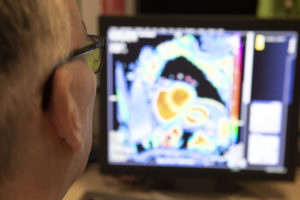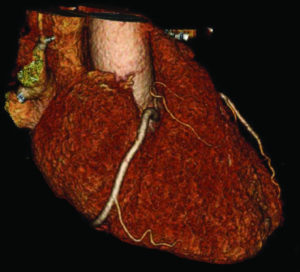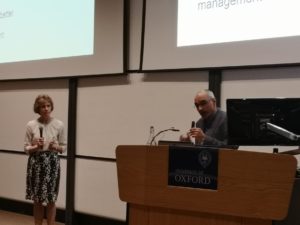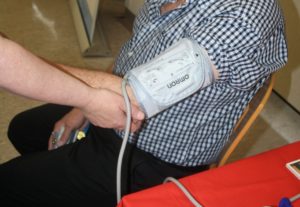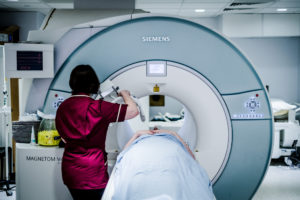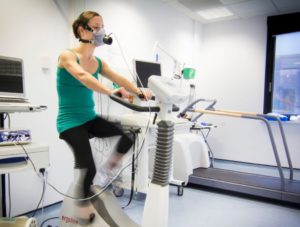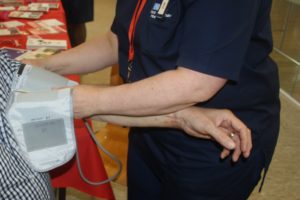A study by Oxford researchers, supported by the NIHR Oxford Biomedical Research Centre (BRC), found that ACE inhibitors and ARBs – both common treatments for high blood pressure and heart failure – are not generally linked to an increased risk of severe COVID-19 disease or an increased likelihood of ... READ MORE
News for Cardiovascular Medicine
Thousands miss out on life-saving heart attack treatment due to COVID-19 pandemic
Researchers at the University of Oxford have published new research that shows that by the end of May there had been about 5,000 fewer hospital admissions with heart attack in 2020 than would be expected, suggesting that many patients have missed out on lifesaving treatment. The research showed ... READ MORE
Link between high cholesterol and aortic valve disease risk found
Oxford researchers have found that while having high cholesterol levels does not influence a person’s risk of aortic or mitral regurgitation, it does increase their risk of developing another major heart valve disease - aortic stenosis. Aortic stenosis is the most common form of heart valve ... READ MORE
Oxford haematologists win national awards to further their research
Two consultant haematologists at the Oxford Haemophilia and Thrombosis Centre (OHTC), based at the Churchill Hospital, have been awarded funding for their research as part of a new national scheme. Dr Nicola Curry and Dr Susie Shapiro were among the recipients of the new Clinical Academic ... READ MORE
AI identifies ‘fingerprint’ that predicts heart attack risk
Oxford researchers have developed a new biomarker – derived through artificial intelligence analysis of routine CT scans – that can identify people at high risk of a fatal heart attack at least five years before it strikes. The researchers, who are supported by the NIHR Oxford Biomedical Research ... READ MORE
Heart failure care must address patients’ broader health if survival rates are to improve
Oxford BRC-supported researchers have provided new evidence that might explain why the prognosis of heart failure patients has improved so little over the past decade. Findings show that a decline in cardiovascular deaths has been offset by an increase in the number of deaths from infections and ... READ MORE
New approach to reducing damage after a heart attack
During the emergency procedure used to reopen the blocked artery that has caused a heart attack, smaller ‘micro’ blood vessels can remain constricted, causing significant damage, according to a new study. The research by Associate Professor Neil Herring of the University of Oxford’s Department of ... READ MORE
Research suggests high blood pressure is major cause of heart valve disease
New research has conclusively found that long-term exposure to high blood pressure increases the risk of heart valve disease, with significant implications for clinical practice guidelines and health management. “Clinical practice guidelines currently make little reference to preventative ... READ MORE
Women and older people most likely to experience shortcomings in heart failure care
A study of 93,000 UK adults with heart failure has revealed critical care shortcomings in diagnostic tests, drug prescriptions, and follow-up patterns, with women and those over 75 years of age disproportionately affected. The study by The George Institute for Global Health at the University of ... READ MORE
Oxford researchers spot tell-tale signs of potentially fatal cardiac condition
Researchers in Oxford have employed a technique more commonly used in brain imaging to identify the tell-tale signs of the potentially fatal heart condition hypertrophic cardiomyopathy, the leading cause of sudden cardiac death in young people. This Oxford BRC-supported study is the first time ... READ MORE
Event showcases BRC work tackling chronic diseases
Around 170 people attended a BRC event on Tuesday (26 March) that provided an opportunity to network and to hear about the breadth of research taking place in Oxford to combat chronic diseases such as diabetes, obesity, cardiovascular disease and dementia. The Chronic Disease Cluster, ... READ MORE
Only “modest” improvement in heart failure survival rates since 2000
Survival after a diagnosis of heart failure in the United Kingdom has shown only modest improvement in the 21st Century and lags behind other serious conditions, such as cancer, a large study supported by the Oxford Biomedical Research Centre has found. The findings, published by the BMJ, also ... READ MORE
Nitric Oxide conference gets under way in Oxford
Delegates from round the world have descended on Oxford for the 10th international conference of the Nitric Oxide Society, which has got under way. This year, the NIHR oxford Biomedical Research Centre is among the sponsors of the event. The conference, which is being held at the University of ... READ MORE
Research reveals link between high blood pressure and risk of aortic valve disease
New research has found that long-term exposure to high blood pressure is associated with an increased risk of aortic valve disease, with significant implications for clinical practice guidelines and health management. The findings, published in the European Heart Journal, are from a study of 5.4 ... READ MORE
Study shows new technology can predict fatal heart attacks
Researchers at the University of Oxford, supported by the NIHR Oxford Biomedical Research Centre (BRC), have developed a new technology based on analysis of computed tomography (CT) coronary angiograms that can identify patients at risk of deadly heart attacks years before they occur. Heart ... READ MORE
Lifestyle factors linked to brain health of young adults
Researchers at Oxford’s John Radcliffe Hospital have used advanced magnetic resonance imaging (MRI) to investigate whether factors such as blood pressure, fitness, smoking and alcohol intake during young adult life are associated with changes in the blood vessels inside the brain. The University ... READ MORE
Fourth digital health product developed as part of Sensyne agreement
A software product that underpins a remote management service for patients with heart failure has been licensed by the UK digital health company Sensyne Health as part of a strategic research agreement with the University of Oxford and Oxford University Hospitals (OUH) NHS Foundation ... READ MORE
Premature hearts less able to cope with exercise
The hearts of people born prematurely are less able to cope with the pressures of exercise in adulthood, according to a new study funded by the NIHR Oxford Biomedical Research Centre. The findings, published in the Journal of the American College of Cardiology, might explain why people born ... READ MORE
Sharp rise in heart disease patients experiencing five or more other conditions
The proportion of people experiencing heart disease and stroke who have five or more other health conditions quadrupled between 2000 and 2014, and the rise was not driven by age, according to new research funded by the NIHR Oxford BRC. The study by The George Institute for Global Health at the ... READ MORE
New funding allows John Radcliffe to expand testing for deadly heart conditions
Thousands more people nationally – and hundreds in our region - could be screened for deadly inherited heart conditions at the John Radcliffe Hospital after it received a grant to expand a genetic testing service. The funding from the Miles Frost Fund and the British Heart Foundation (BHF) was ... READ MORE



